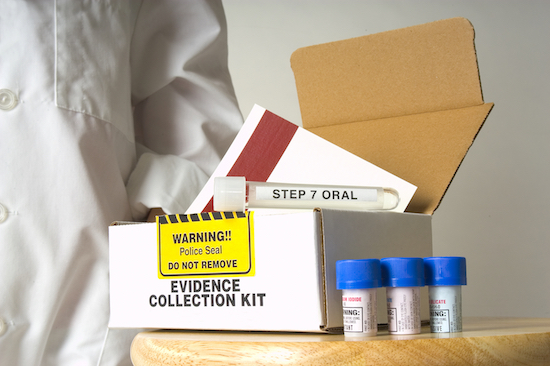The numbers are staggering: hundreds of thousands of rape kits are estimated to have gone unanalyzed—leaving victims without answers and perpetrators free to commit additional crimes. RAINN’s policy department has joined a team of national experts selected by the Justice Department to support states’ work to address and end the backlog of untested and unanalyzed rape kits.
Twenty cities and states are stepping up to the plate to tackle existing and future backlogs, supported by funds from the Justice Department’s Sexual Assault Kit Initiative (SAKI) and Manhattan District Attorney Cyrus Vance. The sites have developed teams of in-state stakeholders including government leaders, victim advocates, law enforcement officials, and other field experts, to assess their backlog, progress, and ongoing needs. The funds they receive can be used for auditing and testing backlogged kits and building responsible notification systems to ensure victims receive timely information about the status of their kit.
RTI International, selected by the Justice Department as the training and technical assistance provider for the SAKI grantees, sought out RAINN to be part of a team of national experts providing help to local sites. In the first few months of the project, RAINN staff have traveled to sites including Jacksonville, FL; Duluth, MN; and Detroit to advise state leaders and advocates about everything from how to inventory backlogged kits to how to notify victims about new developments on their cases.
Blair Bjellos, RAINN’s senior policy associate, who joined the team after several years on Capitol Hill, has been traveling to work directly with the sites. “It’s been an extremely busy first few months on the job, and I’m thrilled to be part of this effort. What’s apparent is that states are solution-oriented; they want to get this right in the interest of supporting survivors and protecting public safety,” said Bjellos.
The training and technical assistance team also includes representatives from the International Association of Chiefs of Police, AEquitas, the SANE-SART Research Service, and the Joyful Heart Foundation, and Rebecca Campbell, Ph.D., from Michigan State University.
The source of the rape kit backlog is complex. While some rape kits were never sent to crime labs for testing, others were sent to labs that lacked the capacity to test, process, and profile these kits given the rate at which they were submitted. This has made it difficult for states working to clear existing backlogs and to ensure this evidence is used to hold perpetrators accountable. SAKI grantees hope to address the latter problem through increased funding and training.
“This project, and others that complement it, are bringing together stakeholders from across the board and supporting solution-focused dialogue critical to ending the national backlog and protecting public safety,” said Rebecca O’Connor, RAINN’s vice president for public policy.
“RAINN also continues to play a dynamic role in training and educating hundreds of SAKI stakeholders,” says O’Connor. She recently spoke to representatives of grantee sites at a national meeting hosted by the Justice Department in Washington, DC, about best practices in victim notification and strategies for effectively communicating with the media about the backlog. RAINN is also presenting a webinar for all SAKI grantees on best practices in victim notification using victim-centered, trauma-informed techniques.
“If a victim submits to have a rape kit done, at any point, that person deserves to know the outcome,” said O’Connor. “These trainings will help states develop standards for reaching out to victims and ensuring that as often as possible, the door to justice is wide open for those who seek to hold a rapist accountable.”
Learn more about SAKI and the rape kit backlog:
About SAKI
SAKI is administered by the Bureau of Justice Assistance (BJA) and aims to create a coordinated community response that ensures just resolution to sexual assault cases through (1) a comprehensive and victim-centered approach, (2) jurisdictional capacity building to prevent high numbers of unsubmitted SAKs in the future, and (3) supporting the investigation and prosecution of cases for which SAKs were previously unsubmitted. Read more about SAKI at www.sakitta.org.
About RAINN
RAINN (Rape, Abuse & Incest National Network) is the nation's largest anti-sexual violence organization and was named one of "America's 100 Best Charities" by Worth magazine. RAINN created and operates the National Sexual Assault Hotline (800.656.HOPE and online.rainn.org) in partnership with more than 1,000 local sexual assault service providers across the country and operates the DoD Safe Helpline for the Department of Defense. In 2015, the Online Hotline expanded to offer services in Spanish at rainn.org/es. The hotlines have helped more than two million people since 1994. RAINN also carries out programs to prevent sexual violence, help victims, and ensure that rapists are brought to justice. RAINN has long-led the national effort to address the rape kit backlog, including as a founding partner in the Rape Kit Action Project and through advocacy for legislation including the Justice for All Reauthorization Act. For more information about RAINN and to get involved, please visit rainn.org.